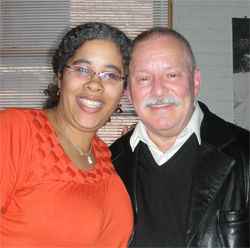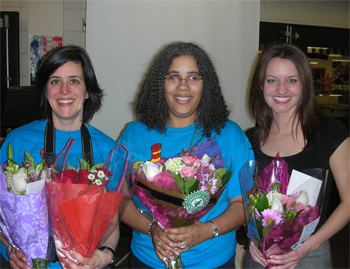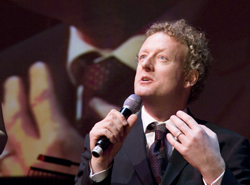Life is a Cabaret*
(*Sorry, I couldn’t resist the title. *wink*)
 This past Sunday, I had the opportunity to attend a workshop hosted by Erv Raible. Erv is the executive and artistic director of the Cabaret Conference at Yale and he was kind enough to schedule a half-day workshop with TCCAN (Twin Cities Cabaret Artists Network) while in town auditioning singers for this summer’s program.
This past Sunday, I had the opportunity to attend a workshop hosted by Erv Raible. Erv is the executive and artistic director of the Cabaret Conference at Yale and he was kind enough to schedule a half-day workshop with TCCAN (Twin Cities Cabaret Artists Network) while in town auditioning singers for this summer’s program.
Six of us arrived after lunch to take part in the workshop. We had stage actors, theater folks, club singers and band front people. Songs ranged from ballads to showtunes to … well story songs for lack of a better descriptor. My friend Matt Curney (a fellow McNally alum) was our pianist and the range of singers and songs was diverse. We took turns singing songs for Erv and then got to hear his feedback and insights about our performances.
…
I was a little apprehensive because I hadn’t had as much time to prepare as I would have liked. I was also apprehensive about working in the cabaret genre. See, I have to admit that I didn’t really understand what cabaret is.
…
Erv was brilliant and kind. While he readily admits to having no desire to perform, he knows a lot about what he wants to see on stage. He encouraged us to strip away anything that was distracting or extraneous. Introductions, gestures and melodic phrases should be there only if they help you connect with the audience — to better tell the story. Erv expected connection, intimacy and vulnerability.
…
Even though I struggled at times during our four-hour session, I was grateful for the opportunity to get inside my songs and think about what I want to say with the songs I sing. The group was supportive and the practice was invaluable.
…
Sunday’s workshop dovetailed nicely with a conversation Bruce Henry and I had on Friday. Bruce and I talked about how to find and choose songs. He challenged me to be more purposeful in choosing my repertoire. Over the course of this weekend’s instruction, I realized I need to find a way to connect what I know and love about singing from improv and my a cappella group to my individual performances. To incorporate connecting and community building into ALL the music I sing, not just Songtaneous.
…
At the end of our time together, Erv asked us to share what we had learned. I was reminded that communicating a song is different from just singing it. I learned that I want to be more intentional about the songs I sing and how I prepare to sing them.
I learned that cabaret is about taking risks by being open and vulnerable. It’s about telling stories and sharing experiences. It’s about being present and connected and available.
And I’m all about that.

 As I mentioned in Friday’s post, I got to hear the UK’s ambassador of singing — Howard Goodall — speak last week. He talked about how the Sing Up program in Britain began.
As I mentioned in Friday’s post, I got to hear the UK’s ambassador of singing — Howard Goodall — speak last week. He talked about how the Sing Up program in Britain began.